小学时态讲解
- 格式:doc
- 大小:203.00 KB
- 文档页数:6
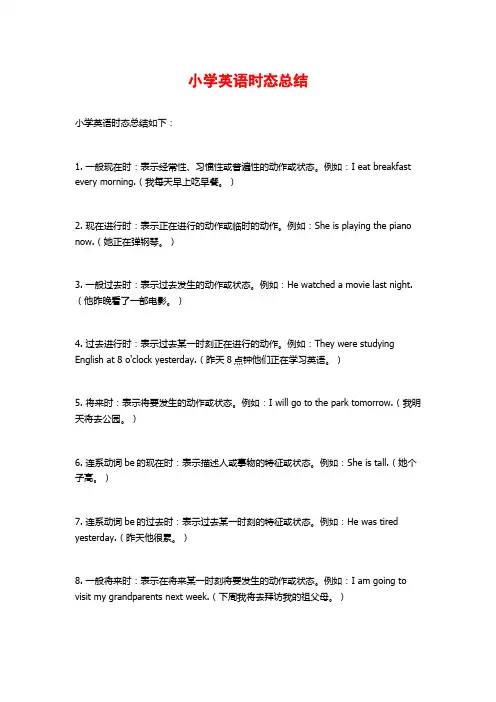
小学英语时态总结小学英语时态总结如下:1. 一般现在时:表示经常性、习惯性或普遍性的动作或状态。
例如:I eat breakfast every morning.(我每天早上吃早餐。
)2. 现在进行时:表示正在进行的动作或临时的动作。
例如:She is playing the piano now.(她正在弹钢琴。
)3. 一般过去时:表示过去发生的动作或状态。
例如:He watched a movie last night.(他昨晚看了一部电影。
)4. 过去进行时:表示过去某一时刻正在进行的动作。
例如:They were studying English at 8 o'clock yesterday.(昨天8点钟他们正在学习英语。
)5. 将来时:表示将要发生的动作或状态。
例如:I will go to the park tomorrow.(我明天将去公园。
)6. 连系动词be的现在时:表示描述人或事物的特征或状态。
例如:She is tall.(她个子高。
)7. 连系动词be的过去时:表示过去某一时刻的特征或状态。
例如:He was tired yesterday.(昨天他很累。
)8. 一般将来时:表示在将来某一时刻将要发生的动作或状态。
例如:I am going to visit my grandparents next week.(下周我将去拜访我的祖父母。
)9. 现在完成时:表示过去某一时刻开始的动作一直持续到现在或刚刚完成的动作。
例如:We have traveled to many countries.(我们去过许多国家。
)10. 过去完成时:表示在过去某一时刻或动作之前已经完成的动作。
例如:They had already finished their homework when I arrived.(当我到达时,他们已经完成作业了。
)需要注意的是,小学阶段通常只学习到简单的时态,而复杂的时态和语态会在中学阶段学习。
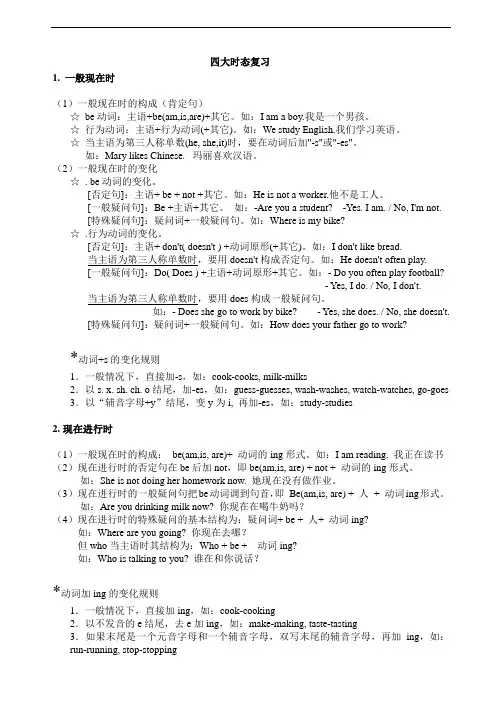
四大时态复习1. 一般现在时(1)一般现在时的构成(肯定句)☆be动词:主语+be(am,is,are)+其它。
如:I am a boy.我是一个男孩。
☆行为动词:主语+行为动词(+其它)。
如:We study English.我们学习英语。
☆当主语为第三人称单数(he, she,it)时,要在动词后加"-s"或"-es"。
如:Mary likes Chinese. 玛丽喜欢汉语。
(2)一般现在时的变化☆. be动词的变化。
[否定句]:主语+ be + not +其它。
如:He is not a worker.他不是工人。
[一般疑问句]:Be +主语+其它。
如:-Are you a student? -Yes. I am. / No, I'm not.[特殊疑问句]:疑问词+一般疑问句。
如:Where is my bike?☆.行为动词的变化。
[否定句]:主语+ don't( doesn't ) +动词原形(+其它)。
如:I don't like bread.当主语为第三人称单数时,要用doesn't构成否定句。
如:He doesn't often play.[一般疑问句]:Do( Does ) +主语+动词原形+其它。
如:- Do you often play football?- Yes, I do. / No, I don't.当主语为第三人称单数时,要用does构成一般疑问句。
如:- Does she go to work by bike? - Yes, she does. / No, she doesn't.[特殊疑问句]:疑问词+一般疑问句。
如:How does your father go to work?*动词+s的变化规则1.一般情况下,直接加-s,如:cook-cooks, milk-milks2.以s. x. sh. ch. o结尾,加-es,如:guess-guesses, wash-washes, watch-watches, go-goes 3.以“辅音字母+y”结尾,变y为i, 再加-es,如:study-studies2.现在进行时(1)一般现在时的构成:be(am,is, are)+ 动词的ing形式。
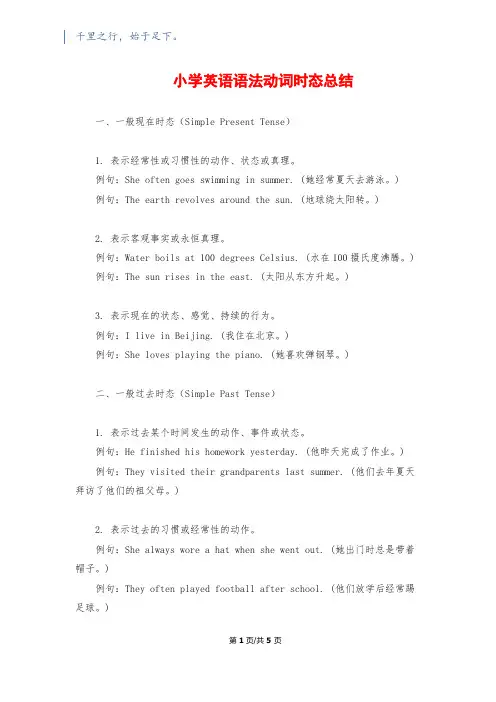
小学英语语法动词时态总结一、一般现在时态(Simple Present Tense)1. 表示经常性或习惯性的动作、状态或真理。
例句:She often goes swimming in summer. (她经常夏天去游泳。
)例句:The earth revolves around the sun. (地球绕太阳转。
)2. 表示客观事实或永恒真理。
例句:Water boils at 100 degrees Celsius. (水在100摄氏度沸腾。
) 例句:The sun rises in the east. (太阳从东方升起。
)3. 表示现在的状态、感觉、持续的行为。
例句:I live in Beijing. (我住在北京。
)例句:She loves playing the piano. (她喜欢弹钢琴。
)二、一般过去时态(Simple Past Tense)1. 表示过去某个时间发生的动作、事件或状态。
例句:He finished his homework yesterday. (他昨天完成了作业。
) 例句:They visited their grandparents last summer. (他们去年夏天拜访了他们的祖父母。
)2. 表示过去的习惯或经常性的动作。
例句:She always wore a hat when she went out. (她出门时总是带着帽子。
)例句:They often played football after school. (他们放学后经常踢足球。
)第1页/共5页3. 表示过去的真理或现状。
例句:He thought the earth was flat. (他认为地球是平的。
)例句:The dinosaurs became extinct millions of years ago. (恐龙在几百万年前灭绝了。
)三、一般将来时态(Simple Future Tense)1. 表示将要发生的动作或事件。
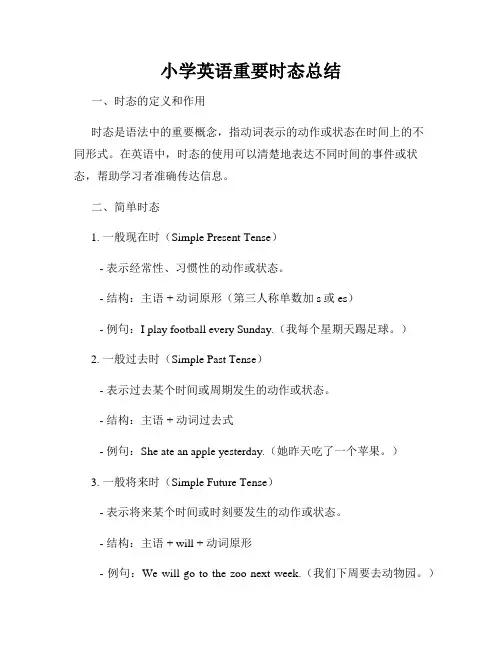
小学英语重要时态总结一、时态的定义和作用时态是语法中的重要概念,指动词表示的动作或状态在时间上的不同形式。
在英语中,时态的使用可以清楚地表达不同时间的事件或状态,帮助学习者准确传达信息。
二、简单时态1. 一般现在时(Simple Present Tense)- 表示经常性、习惯性的动作或状态。
- 结构:主语 + 动词原形(第三人称单数加s或es)- 例句:I play football every Sunday.(我每个星期天踢足球。
)2. 一般过去时(Simple Past Tense)- 表示过去某个时间或周期发生的动作或状态。
- 结构:主语 + 动词过去式- 例句:She ate an apple yesterday.(她昨天吃了一个苹果。
)3. 一般将来时(Simple Future Tense)- 表示将来某个时间或时刻要发生的动作或状态。
- 结构:主语 + will + 动词原形- 例句:We will go to the zoo next week.(我们下周要去动物园。
)三、进行时态1. 现在进行时(Present Continuous Tense)- 表示现在正在进行的动作或状态。
- 结构:主语 + be(am/is/are)+ 动词-ing形式- 例句:He is playing basketball now.(他现在正在打篮球。
)2. 过去进行时(Past Continuous Tense)- 表示过去某个时间点或时间段正在进行的动作或状态。
- 结构:主语 + was/were + 动词-ing形式- 例句:They were studying English at 8 o'clock yesterday evening.(昨天晚上8点他们在学习英语。
)四、完成时态1. 现在完成时(Present Perfect Tense)- 表示过去某个时间点前发生的动作或状态对现在造成的影响。
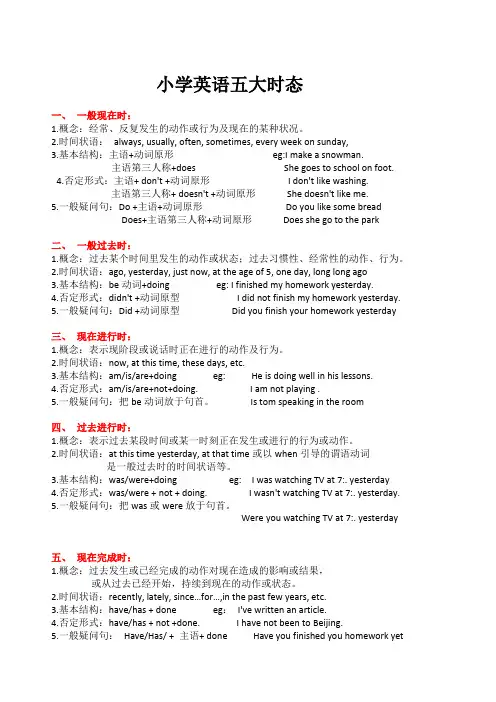
小学英语五大时态一、一般现在时:1.概念:经常、反复发生的动作或行为及现在的某种状况。
2.时间状语:always, usually, often, sometimes, every week on sunday,3.基本结构:主语+动词原形eg:I make a snowman.主语第三人称+does She goes to school on foot. 4.否定形式:主语+ don't +动词原形I don't like washing.主语第三人称+ doesn't +动词原形She doesn't like me.5.一般疑问句:Do +主语+动词原形Do you like some breadDoes+主语第三人称+动词原形Does she go to the park二、一般过去时:1.概念:过去某个时间里发生的动作或状态;过去习惯性、经常性的动作、行为。
2.时间状语:ago, yesterday, just now, at the age of 5, one day, long long ago3.基本结构:be动词+doing eg: I finished my homework yesterday.4.否定形式:didn't +动词原型I did not finish my homework yesterday.5.一般疑问句:Did +动词原型Did you finish your homework yesterday三、现在进行时:1.概念:表示现阶段或说话时正在进行的动作及行为。
2.时间状语:now, at this time, these days, etc.3.基本结构:am/is/are+doing eg: He is doing well in his lessons.4.否定形式:am/is/are+not+doing. I am not playing .5.一般疑问句:把be动词放于句首。
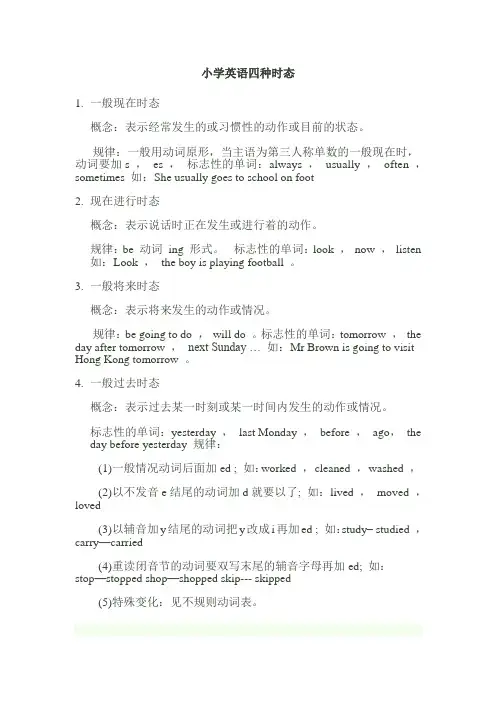
小学英语四种时态1.一般现在时态概念:表示经常发生的或习惯性的动作或目前的状态。
规律:一般用动词原形,当主语为第三人称单数的一般现在时,动词要加s ,es ,标志性的单词:always ,usually ,often ,sometimes 如:She usually goes to school on foot2.现在进行时态概念:表示说话时正在发生或进行着的动作。
规律:be 动词ing 形式。
标志性的单词:look ,now ,listen 如:Look ,the boy is playing football 。
3.一般将来时态概念:表示将来发生的动作或情况。
规律:be going to do ,will do 。
标志性的单词:tomorrow ,the day after tomorrow ,next Sunday … 如:Mr Brown is going to visit Hong Kong tomorrow 。
4.一般过去时态概念:表示过去某一时刻或某一时间内发生的动作或情况。
标志性的单词:yesterday ,last Monday ,before ,ago,the day before yesterday 规律:(1)一般情况动词后面加ed ; 如:worked ,cleaned ,washed ,(2)以不发音e结尾的动词加d就要以了; 如:lived ,moved ,loved(3)以辅音加y结尾的动词把y改成i再加ed ; 如:study– studied ,carry—carried(4)重读闭音节的动词要双写末尾的辅音字母再加ed; 如:stop—stopped shop—shopped skip--- skipped(5)特殊变化:见不规则动词表。
小学英语固定搭配Good night 晚安.in the morning 在早上at noon 在中午in the afternoon 在下午in the evening 在傍晚at night 在夜间have/eat breakfast 吃早饭have/eat lunch 吃午饭have/eat supper(dinner) 吃晚饭read a book 读书sing a song 唱歌have a meeting 开会have class 上课have a party 聚会have a competition 竞赛have a sleep 睡觉have a snack 吃零食have a picnic 野餐have a buffet dinner 吃自助餐draw pictures 画画listen to music 听音乐listen to the radio 听收音机learn English 学习英语learn Chinese 学习语文Learn math 学习数学tell stories 讲故事take a walk 散步ask and answer questions 问答问题fly a kite 放风筝ride a bike 骑自行车ride a horse 骑马play computer games 玩电脑游戏play games 做游戏play hide and seek 玩捉迷藏do homework 做作业watch TV 看电视take a shower 洗淋浴take a bath 洗澡open the door 开门open the window 开窗户close the door 关门close the window 关窗户paly football 踢足球/打橄榄球play basketball 打篮球play volleyball 打排球play badminton 打羽毛球play golf 打高尔夫球play bowling 打保龄球play table tennis 打乒乓球play baseball 打棒球play tennis 打网球play soccer 踢足球play hockey 打曲棍球play chess 下棋go fishing 去钓鱼go swimming 去游泳go shopping 去购物go skating 去滑冰go bike-riding/ go cycling 去骑自行车go sking 去滑雪go camping 去野营listen to the news 听新闻read the newspaper 看报read the magazine 看杂志go to school 去上学go home 回家go to the park 去公园go to the zoo 去动物园go to the library 去图书馆go to the hospital 去医院go to the cinema 去电影院go to see a film /movie去看电影get up 起床go to bed 上床go to sleep 去睡觉brush the teeth 刷牙wash the hands 洗手wash the face 洗脸wash clothes 洗衣服air the room 给房间通风make the bed 铺床sweep the floor 扫地mop the floor 拖地clean the room 打扫房间climb the trees 爬树climb the mountains 爬山cook the meals 做饭drink milk/juice/coca cola 喝牛奶/果汁/可乐play the piano 弹钢琴play the violin 拉小提琴play the drum 打鼓play the guitar 弹吉他play the xylophone 弹木琴play the flute 吹笛子play the harp 弹竖琴play the erhu 拉二胡play the zither 弹古筝play the banjo 弹班卓play the trumpet 吹小号stay at home 呆在家里at home 在家at school 在学校at church 在教堂make a cake 做蛋糕take pictures/photos 照相comb hair 梳头发have a haircut 理发go away 走开at the weekend 在周末stand up 起立sit down 坐下New year 元旦Spring Festival 春节Lantern Festival 元宵节Spring Cleaning Day 清明节Dragon Boat Festival 龙舟节International labour day 国际劳动节Trees planting day 植树节Children's day 儿童节Party's day 党的生日Army's day 建军节Teacher's day 教师节National day 国庆节Thanksgiving day 感恩节Chrismas day 圣诞节in the morning 在早上at noon 在中午in the afternoon 在下午in the evening 在傍晚at night 在夜间have/eat breakfast 吃早饭have/eat lunch 吃午饭have/eat supper(dinner) 吃晚饭read a book 读书sing a song 唱歌have a meeting 开会have class 上课have a party 聚会have a competition 竞赛have a sleep 睡觉have a snack 吃零食have a picnic 野餐have a buffet dinner 吃自助餐draw pictures 画画listen to music 听音乐listen to the radio 听收音机learn English 学习英语learn Chinese 学习语文Learn math 学习数学tell stories 讲故事take a walk 散步ask and answer questions 问答问题fly a kite 放风筝ride a bike 骑自行车ride a horse 骑马play computer games 玩电脑游戏play games 做游戏play hide and seek 玩捉迷藏do homework 做作业watch TV 看电视take a shower 洗淋浴take a bath 洗澡open the door 开门open the window 开窗户close the door 关门close the window 关窗户paly football 踢足球/打橄榄球play basketball 打篮球play volleyball 打排球play badminton 打羽毛球play golf 打高尔夫球play bowling 打保龄球play table tennis 打乒乓球play baseball 打棒球play tennis 打网球play soccer 踢足球play hockey 打曲棍球play chess 下棋go fishing 去钓鱼go swimming 去游泳go shopping 去购物go skating 去滑冰go bike-riding/ go cycling 去骑自行车go sking 去滑雪go camping 去野营listen to the news 听新闻read the newspaper 看报read the magazine 看杂志go to school 去上学go home 回家go to the park 去公园go to the zoo 去动物园go to the library 去图书馆go to the hospital 去医院go to the cinema 去电影院go to see a film /movie去看电影get up 起床go to bed 上床go to sleep 去睡觉brush the teeth 刷牙wash the hands 洗手wash the face 洗脸wash clothes 洗衣服air the room 给房间通风make the bed 铺床sweep the floor 扫地mop the floor 拖地clean the room 打扫房间climb the trees 爬树climb the mountains 爬山cook the meals 做饭drink milk/juice/coca cola 喝牛奶/果汁/可乐play the piano 弹钢琴play the violin 拉小提琴play the drum 打鼓play the guitar 弹吉他play the xylophone 弹木琴play the flute 吹笛子play the harp 弹竖琴play the erhu 拉二胡play the zither 弹古筝play the banjo 弹班卓play the trumpet 吹小号stay at home 呆在家里at home 在家at school 在学校at church 在教堂make a cake 做蛋糕take pictures/photos 照相comb hair 梳头发have a haircut 理发go away 走开at the weekend 在周末stand up 起立sit down 坐下New year 元旦Spring Festival 春节Lantern Festival 元宵节Spring Cleaning Day 清明节Dragon Boat Festival 龙舟节International labour day 国际劳动节Trees planting day 植树节Children's day 儿童节Party's day 党的生日Army's day 建军节Teacher's day 教师节National day 国庆节小学英语动词过去式agree 同意agreedask 问askedanswer 回答answeredbecome 成为becamebegin 开始beganbring 带来broughtbuy 买boughtcall 呼叫calledcarry 搬运carriedcatch 抓住caughtcheck 检查checkedclean 清洁cleanedclimb 爬climbedcome 来camecook 煮cookedcut 切cutdance 跳舞danceddo 做diddraw 画drewdrink 喝drankdrive 驾驶droveeat 吃ateenjoy 欣赏enjoyedfeel 感觉feltfly 飞fliedforget 忘记forgotfish 钓鱼fishedget 得到gotgive 给gavego 去wentgrow 成长grewhave 有hadhear 听到heardhelp 帮助helpedjump 跳jumpedkeep 保存keptknow 知道knewlearn 学习learned listen 听listenedlike 喜欢likedlook 看lookedlive 生活livedlove 喜爱lovedmake 做mademeet 遇见metmove 移动moved need 需要needed open 打开opened paint 画paintedpick 摘pickedplay 玩playedplan 计划planned practise 练习practised prefer 更喜欢preferred put 放putread 读readride 骑roderun 跑ransay 说saidsee 看sawsit 坐satskip 跳skippedspeak 说spokestart 开始startedstay 停留stayed sweep 扫sweptstudy 学习studied swim 游泳swamtalk 谈话talkedtake 带去tookteach 教taughtthank 谢谢thanked tell 告诉toldthink 想thought travel 旅游traveledtry 试trieduse 使用used wake 醒来woke walk 走路walked want 想wanted wash 洗washed watch 看watched water 浇水watered wave 挥动waved work 工作worked worry 担心worried write 写wrote小学英语可数名词复数形式1)以y结尾的专有名词,或元音字母+y 结尾的名词变复数时,直接加s变复数。
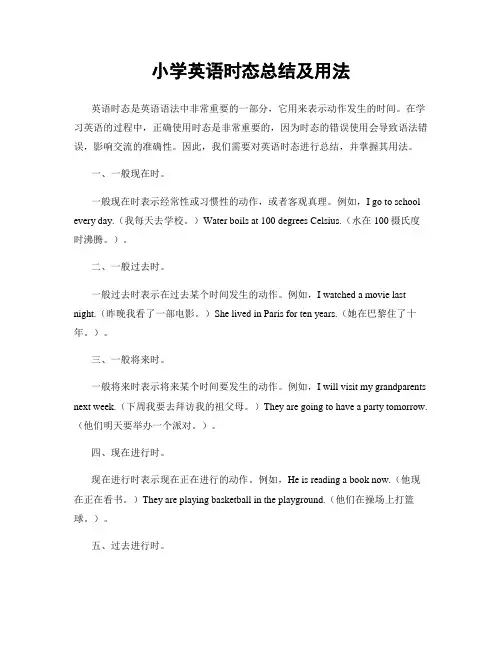
小学英语时态总结及用法英语时态是英语语法中非常重要的一部分,它用来表示动作发生的时间。
在学习英语的过程中,正确使用时态是非常重要的,因为时态的错误使用会导致语法错误,影响交流的准确性。
因此,我们需要对英语时态进行总结,并掌握其用法。
一、一般现在时。
一般现在时表示经常性或习惯性的动作,或者客观真理。
例如,I go to school every day.(我每天去学校。
)Water boils at 100 degrees Celsius.(水在100摄氏度时沸腾。
)。
二、一般过去时。
一般过去时表示在过去某个时间发生的动作。
例如,I watched a movie last night.(昨晚我看了一部电影。
)She lived in Paris for ten years.(她在巴黎住了十年。
)。
三、一般将来时。
一般将来时表示将来某个时间要发生的动作。
例如,I will visit my grandparents next week.(下周我要去拜访我的祖父母。
)They are going to have a party tomorrow.(他们明天要举办一个派对。
)。
四、现在进行时。
现在进行时表示现在正在进行的动作。
例如,He is reading a book now.(他现在正在看书。
)They are playing basketball in the playground.(他们在操场上打篮球。
)。
五、过去进行时。
过去进行时表示在过去某个时间正在进行的动作。
例如,I was studying when she called me.(她给我打电话时,我正在学习。
)They were playing games at that time.(那个时候他们在玩游戏。
)。
六、将来进行时。
将来进行时表示将来某个时间正在进行的动作。
例如,I will be sleeping at 10 o'clock tonight.(今晚十点我将在睡觉。
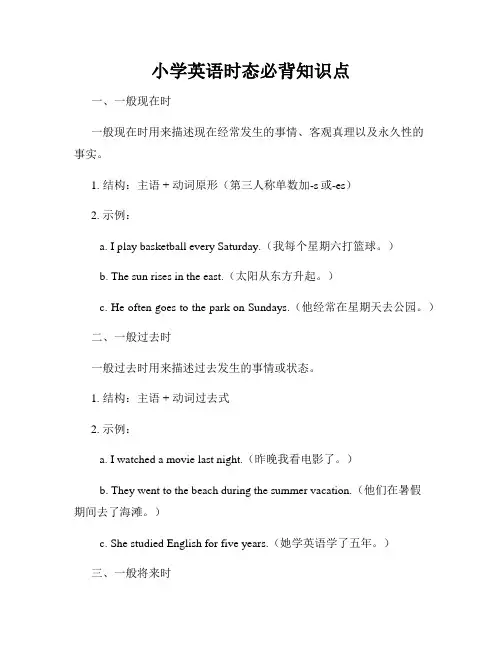
小学英语时态必背知识点一、一般现在时一般现在时用来描述现在经常发生的事情、客观真理以及永久性的事实。
1. 结构:主语 + 动词原形(第三人称单数加-s或-es)2. 示例:a. I play basketball every Saturday.(我每个星期六打篮球。
)b. The sun rises in the east.(太阳从东方升起。
)c. He often goes to the park on Sundays.(他经常在星期天去公园。
)二、一般过去时一般过去时用来描述过去发生的事情或状态。
1. 结构:主语 + 动词过去式2. 示例:a. I watched a movie last night.(昨晚我看电影了。
)b. They went to the beach during the summer vacation.(他们在暑假期间去了海滩。
)c. She studied English for five years.(她学英语学了五年。
)三、一般将来时一般将来时用于表达将来的动作或计划。
1. 结构:主语 + will + 动词原形2. 示例:a. We will have a picnic next weekend.(下周末我们要去野餐。
)b. He will visit his grandparents tomorrow.(明天他要去看望他的祖父母。
)c. I will call you later.(我待会儿给你打电话。
)四、现在进行时现在进行时用来描述现在正在进行的动作。
1. 结构:主语 + am/is/are + 动词-ing形式2. 示例:a. She is reading a book now.(她正在看书。
)b. They are playing soccer in the park.(他们正在公园里踢足球。
)c. We are studying for the English test.(我们正在为英语考试学习。
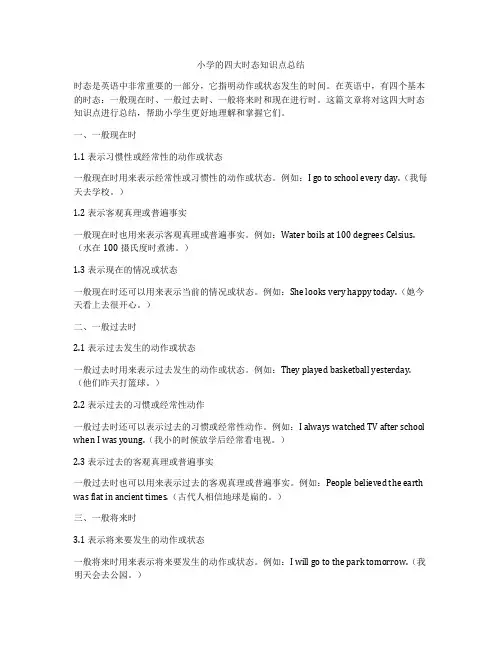
小学的四大时态知识点总结时态是英语中非常重要的一部分,它指明动作或状态发生的时间。
在英语中,有四个基本的时态:一般现在时、一般过去时、一般将来时和现在进行时。
这篇文章将对这四大时态知识点进行总结,帮助小学生更好地理解和掌握它们。
一、一般现在时1.1 表示习惯性或经常性的动作或状态一般现在时用来表示经常性或习惯性的动作或状态。
例如:I go to school every day.(我每天去学校。
)1.2 表示客观真理或普遍事实一般现在时也用来表示客观真理或普遍事实。
例如:Water boils at 100 degrees Celsius.(水在100摄氏度时煮沸。
)1.3 表示现在的情况或状态一般现在时还可以用来表示当前的情况或状态。
例如:She looks very happy today.(她今天看上去很开心。
)二、一般过去时2.1 表示过去发生的动作或状态一般过去时用来表示过去发生的动作或状态。
例如:They played basketball yesterday.(他们昨天打篮球。
)2.2 表示过去的习惯或经常性动作一般过去时还可以表示过去的习惯或经常性动作。
例如:I always watched TV after school when I was young.(我小的时候放学后经常看电视。
)2.3 表示过去的客观真理或普遍事实一般过去时也可以用来表示过去的客观真理或普遍事实。
例如:People believed the earth was flat in ancient times.(古代人相信地球是扁的。
)三、一般将来时3.1 表示将来要发生的动作或状态一般将来时用来表示将来要发生的动作或状态。
例如:I will go to the park tomorrow.(我明天会去公园。
)3.2 表示对将来的预测或打算一般将来时还可以表示对将来的预测或打算。
例如:I think it will rain this afternoon.(我觉得今天下午会下雨。
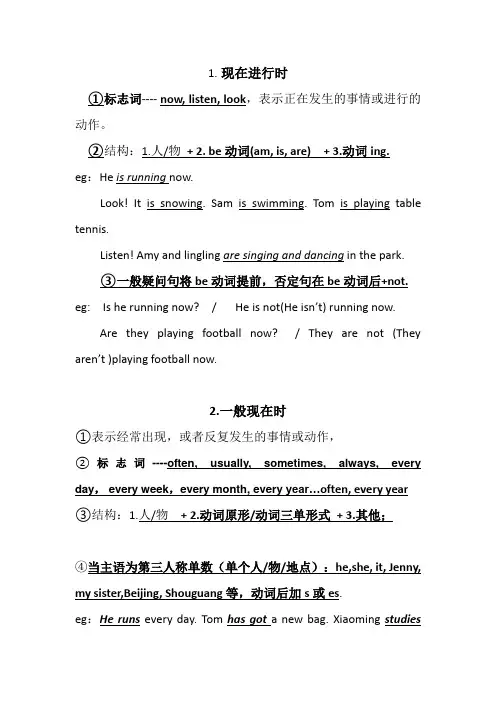
1.现在进行时①标志词---- now, listen, look,表示正在发生的事情或进行的动作。
②结构:1.人/物+ 2. be动词(am, is, are) + 3.动词ing. eg:He is running now.Look! It is snowing. Sam is swimming. Tom is playing table tennis.Listen! Amy and lingling are singing and dancing in the park.③一般疑问句将be动词提前,否定句在be动词后+not. eg: Is he running now? / He is not(He isn’t) running now.Are they playing football now? / They are not (They aren’t )playing football now.2.一般现在时①表示经常出现,或者反复发生的事情或动作,②标志词----often, usually, sometimes, always, every③结构:1.人/物+ 2.动词原形/动词三单形式+ 3.其他;④当主语为第三人称单数(单个人/物/地点):he,she, it, Jenny, my sister,Beijing, Shouguang等,动词后加s或es.eg:He runs every day. Tom has got a new bag. Xiaoming studiesvery hard every day. Mr Smart speaks Chinese very well. They often read books .问句借助于do, does。
否定句借助于don’t, doesn’t,后面动词一定要还原。
Does he run every day? / He doesn’t run every day.Do they often read books? / They don’t often read books.3.一般过去时①表示发生在过去的事情或者事件,标志词----in the past,then, two hours (ago), yesterday, last week,last month; last year。
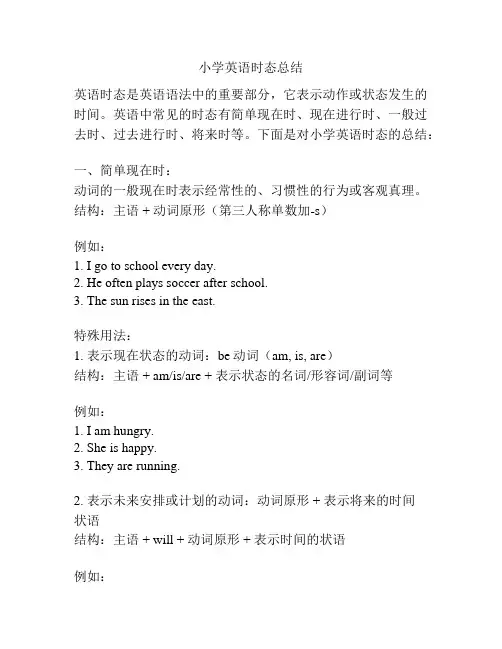
小学英语时态总结英语时态是英语语法中的重要部分,它表示动作或状态发生的时间。
英语中常见的时态有简单现在时、现在进行时、一般过去时、过去进行时、将来时等。
下面是对小学英语时态的总结:一、简单现在时:动词的一般现在时表示经常性的、习惯性的行为或客观真理。
结构:主语 + 动词原形(第三人称单数加-s)例如:1. I go to school every day.2. He often plays soccer after school.3. The sun rises in the east.特殊用法:1. 表示现在状态的动词:be动词(am, is, are)结构:主语 + am/is/are + 表示状态的名词/形容词/副词等例如:1. I am hungry.2. She is happy.3. They are running.2. 表示未来安排或计划的动词:动词原形 + 表示将来的时间状语结构:主语 + will + 动词原形 + 表示时间的状语例如:1. We will have a picnic next Sunday.2. He will go to the movies tonight.3. She will visit her grandparents tomorrow.二、现在进行时:动词的现在进行时表示正在进行的动作。
结构:主语 + be动词(am, is, are)+ 动词-ing例如:1. I am studying now.2. He is playing basketball.3. They are watching TV.特殊用法:1. 表示将来按计划或安排或打算进行的动作结构:主语 + be going to + 动词原形 + 表示时间的状语例如:1. I am going to have dinner with my friends tomorrow.2. They are going to visit the museum next week.3. We are going to watch a movie tonight.三、一般过去时:动词的一般过去时表示过去发生的动作或状态。
小学英语四大时态语法知识点小学英语主要是如下的四大时态:一般现在时、现在进行时、一般过去时、一般将来时。
01一般现在时一、标志词always(总是)usually(通常)often(经常)sometimes(有时)never(从不)every(每一)二、基本用法1.表示事物或人物的特征、状态。
2.表示经常性、习惯性的动作。
3.表示客观现实。
三、构成1.be动词:主语+be动词(am isare)+其它.2.行为动词:主语+行为动词+其它。
四、句型肯定句:A. be 动词:be+主语+其它。
B. 行为动词:主语+动词(注意人称变化)+其它。
否定句:A.be动词:主语+be+not+其它。
B.行为动词:主语+助动词(do/does)+not+d动词原形+其它一般疑问句:A.be动词:be+主语+其它。
B.行为动词:助动词(Do/Does)+主语+动词原形+其他.特殊疑问词:疑问词+一般疑问句02现在进行时一、标志词now(现在), look(看),listen(听)二、基本用法表示现阶段正在进行的动作三、基本结构1.肯定句:主语+be动词+动词现在分词(ing)+其它。
2.否定句:主语+be动词+not+动词现在分词(ing)+其它。
3.一般疑问句:be动词+主语+现在分词(ing)+其它。
4.特殊疑问句:疑问词+一般疑问句。
03一般将来时一、标志词tomorrow(明天),soon(不久),will(将要=be going to)二、基本用法表示在在将来某个时间要发生的动作或存在的状态。
三、基本结构1.肯定句:主语+ be going to + 动词原形。
主语+will+动词原形。
2.否定句:主语+ be going to +动词原形。
主语+won’t + 动词原形3.一般疑问句:Be + 主语+ going to+动词原形Will + 主语+ 动词原形4.特殊疑问句:疑问词+一般疑问句04一般过去时一、标志词yesterday(昨天),ago(以前),before(在...之前)二、用法1.表示过去某个时间发生的动作或存在的状态,常和表示过去的时间状语连用。
语法突击:小学英语必须掌握的4大时态讲解(附专项练习和答案)时态是英语中一个重要的语法范畴,小学英语主要是如下的四大时态:一般现在时、现在进行时、一般过去时、一般将来时。
都学一在这里帮大家整理总结了小学英语四种时态的用法,希望大家可以熟练掌握。
一般现在时主要描述经常会发生的动作、状态或不变的真理。
句末常出现every day/week/year/Monday , in the morning;句中常有always, usually, often,sometimes组成1.主语 be 名词(形容词)I am a student.He is tall.否定句:在be 后加notI am not a student.He is not tall.疑问句:be 动词提前到第一位。
Are you a student?Yes,I am./No,I am not.Is he tall?Yes,he is./No,he isn’t.组成2.主语动词地点时间We go to school on Monday.He goes to the park on Sunday.否定句:主语 don’t/doesn’t’t 动词原形地点时间We don’t go to school on Monday.He doesn’t go to the park on Sunday.疑问句:在句首加do或doesDo you go to school on Monday?Yes, we do./ No, we don’t.Does he go to the park on Sunday?Yes, he does./ No, he doesn’t.动词第三人称单数变化1. 在原单词末尾加s , 如:like – likes2. 单词以o, sh, ch, s, x 结尾加es, 如:go – goes3. 单词末尾为辅音 y结尾去y加ies 如:study- studies现在进行时主要叙述正在发生的事情。
小学英语四大时态总结小学英语四大时态总结一.一般现在时:1. 一般现在时的简单用法:表示经常的,习惯性的动作或存在的状态。
一般现在时经常与often,always,usually,sometimes,every day等时间状语连用。
否定句:主语+ be + not +其它。
如:He is not a worker.他不是工人。
一般疑问句:Be +主语+其它。
如:-Are you a student? -Yes. I am. / No, I'm not. 特殊疑问句:疑问词+一般疑问句。
如:Where is my bike? 5. 行为动词的变化。
否定句:主语+ don't( doesn't ) +动词原形(+其它)。
如:I don't like bread. 当主语为第三人称单数时,要用doesn't构成否定句。
如:He doesn't often play. 一般疑问句:Do( Does ) +主语+动词原形+其它。
如:- Do you often play football? - Yes, I do. / No, I don't. 当主语为第三人称单数时,要用does 构成一般疑问句。
如:- Does she go to work by bike? - Yes, she does. / No, shedoesn't. 特殊疑问句:疑问词+一般疑问句。
如:How does your father go to work? 二.现在进行时:1.现在进行时:表示现在正在进行或发生的动作,也表示当前一段时间内的活动或现阶段正在进行的动作。
2.结构:be ( am, is, are )+doing (所有的动词+ing)3.ing 的变化规则:2).现在进行时的一般疑问句把be动词调到句首。
Is he working at home? 3).现在进行时的特殊疑问的基本结构为:特殊疑问词+ be + 主语+ 动词ing? What are you doing? 三.一般过去时:Page 1 of 6.I. 一般过去时的概念:表示过去某个时间发生的动作或存在的状态。
小学英语五种时态一、一般现在时:1.概念:(1)经常、反复发生的动作或行为及现在的某种状况。
(2)客观真理,客观存在,科学事实2.时间状语: always, usuall y, often, someti mes, everyweek (day, year, month…),once a week, on Sunday s,3.基本结构:主语+be(am/is/are)/动原(主语为第三人称单数或不可数名词时,动词上要加(e)s )4.否定形式:主语+am/is/are+not;主语+don't /doesn't +动原(前面有助动词do,does时,要把动词还原)5.一般疑问句:be (am/is/are)+主语do /does +主语+动原(前面有助动词do,does时,要把动词还原)6.例句:. It seldom snowshere. 这里很少下雪。
Watergets clean.水变清澈了He is always readyto help others. 他总是乐于助人。
Action speaks louder than words.事实胜于雄辩。
The moon move roundthe earth。
月亮绕着地球转。
二、一般过去时:1.概念:①过去某个时间里发生的动作或状态;②过去习惯性、经常性的动作、行为。
2.时间状语:ago, yester day, the day before yester day(前天), last week(year, night, month…),in1989, just now, at the age of 5,one day, long long ago, once upon a time, etc.3.基本结构:①主语+ was/were ②主语+动词过去式(v-ed)4.否定形式:①主语+ was/were+not ②主语+didn't+动原5.一般疑问句:①Was/Were+主语…②Did+主语+动原…6.例句:She oftencame to help us in thosedays. (过去一段时间内)I didn't know you were so busy. (过去某个时间点)三、一般将来时:1. 概念:表示将要发生的动作或存在的状态及打算、计划或准备做某事。
小学英语必须掌握的几种时态1、一般现在时2、现在进行时3、一般将来时的用法4、一般过去时5、现在完成时一般现在时标志词:(总是) (通常) (经常) (有时) (从不) (每一)行为动词词型变化形式一般现在时动词只有第三人称有词形变化,其他人称(第一人称:I, ;第二人称:;第三人称复数:、)动词均用原形当主语是第三人称单数时,一般动词在一般现在时句子中的变化规律:1、多数在动词后加s —— ,2、以s,x,,,o结尾的动词加–––3、以辅音字母加y结尾,把y改i再加——4、以元音字母加y结尾,直接加s –5、不规则变化—一般现在时基本用法功能1.表示事物或人物的特征、状态。
如: .天空是蓝色的。
2.表示经常性或习惯性的动作。
如:I .我每天六点起床。
3.表示客观现实。
如: .地球绕着太阳转。
.构成1. 动词:主语()+其它。
如:I a .我是一个男孩。
2.行为动词:主语+行为动词(+其它)。
如: .我们学习英语。
句型肯定句:动词:主语+ + 其它成分 a .B.行为动词:主语+动词(注意人称变化) +其它成分 .否定句:动词:主语+ + +其它成分 .B.行为动词:主语+助动词() + +动词原形+其它成分’t .一般疑问句:动词: / +主语 + 其它成分a ? , I . / , I ./ .B.行为动词:助动词()+主语+动词原形 + 其它成分? , I . / . I ’t .() ? , ( ). / , ( )’t.特殊疑问句:疑问词+ 一般疑问句动词: ?B.行为动词: ?一般现在时动词和的变化形式1.动词叫连系动词, 用法:第一人称单数用,第三人称单数用,其它人称用。
2.动词的用法:第三人称单数用以外,其它人称一律用。
如:注意事项 1.在英国,人们常用代替,特别在疑问句和否定句中。
2.当如果不表示“有”时,构成疑问或否定句时,就借助于助动词,如:I a . 否:I a . (表示有)I 12 o’. 否:I ’t 12 o’. (表示吃)现在进行时:标志词:, , ,’时间.现在进行时: 表示正在进行的、发生的动作基本结构:+ 动词肯定句:主语 + 动词(, , )+ 现在分词()+ 其他 I .否定句:主语 + 动词+ + 现在分词()+ 其他 I .一般疑问句:动词(, , ) + 主语 + 现在分词()+ 其他? , I . / , I .特殊疑问句:疑问词+ 一般疑问句?动词的形式的变化规律:1. 直接加——2. 以结尾的动词,直接加——3. 以不发音的结尾的动词,先去再加——4. 末尾只有一个元音字母和一个辅音字母的重读闭音节动词,双写末尾字母,再加—一般将来时的用法:表示将来某一时刻的动作或状态,或将来某一段时间内经常的动作或状态。
小学英语语法时态讲解与归纳—一般现在时一、一般现在时:1. 表示事物或人物的特征、状态。
女口: The sky is blue.天空是蓝色的。
2. 表示经常性或习惯性的动作。
如: I get up at six every day. 我每天六点起床。
3. 表示客观现实。
如: The earth goes around the sun. 地球绕着太阳转。
二 . 构成及变化动词的变化。
肯定句:主语 +be(am,is,are)+ 其它。
如: I am a boy. 我是一个男孩。
否定句:主语 + be + not + 其它。
如: He is not a worker. 他不是工人。
一般疑问句: Be +主语+其它。
如: -Are you a student -Yes. I am. / No,I'm not.特殊疑问句:疑问词 +一般疑问句。
如: Where is my bike2. 行为动词的变化。
l 、当主语为第一,二人称及复数时,助动词为 do肯定句:主语+动词原形(+其它)。
如: Weoften play basketball after school. 否定句:主语 + don't+ 动词原形(+其它)。
如: wedon't play basketball after school. 一般疑问句: Do +主语 +动词原形 +其它如: Do you often play basketball after school l Yes, we do. / No, we don't.特殊疑问句:疑问词 +以 do 开头的一般疑问句如: What do you often do after school3、当主语为第三人称单数时 ,助动词为 does肯定句:主语 +动词三单式(+其它)。
如: He swims well.否定句:主语+ doesn 't+动词原形(+其它)。
小学时态讲解现在进行时一、写出下列单词的现在分词:speak ______ 2. run _______ 3. swim ______ 4. do ____ask _______ 6. begin _______ 7. dance ______ 8.eat ______9. sing ________ 10 fly _______ 11. jog ______ 12. come __ ____13. talk ____ 14. sleep ______ 15. fight _____ 16.jump ______17. get _________18 . buy _______ 19. cook __________ 20.skate __________二、用所给的动词的正确形式填空:1.The boy __________________ ( draw)a picture now.2. Listen .Some girls _______________ ( sing)in the classroom .3. My mother _________________ ( cook )some nice food now.4. What _____ you ______ ( do ) now?5. Look . They _______________( have) an English lesson .6.They ____________(not ,water) the flowers now.7.Look! the girls ________________(dance )in the classroom .8.What is our granddaughter doing? She _________(listen ) to music.9. It’s 5 o’clock now. We _____________(have)supper now10.______Helen____________(wash )clothes? Yes ,she is .三、选择正确答案1. Every one ____ to their teacher in the classroom.A. are listeningB. is listeningC. listen2. They are singing and ___ together at the party now.A. danceB. dancedC. dancing3. Listen! The birds ____.A. is singingB. are singC. are singing4. Look! The kite ___ in the sky.A. flyB. fliesC. is flying5. They ____ riding a forse.A. isB. areC. am6. Kate ____ playing chess.A. amB. isC. are7. Are you washing clothes?A. Yes, you areB. Yes, I amC. No, I am8. Is he ____ TV?Yes, he is.A. watchB. watchingC. not9. ____ they taking pictures.? Yes, they are.A. AmB. BeC. Are四、判断句子的正误。
1. He’s writing a story.2. Your mother is reads a magazine now.3. I’m ridding a bike.4. The lions are walking.5. He’s drawed picture.五、根据中文填空。
1. Sandy 正在弹钢琴。
Sandy ______ ________ the piano.2. 听,她们正在说英语。
Listen, _______ are _______ English.3.我正在做家庭作业。
I _________ _________ my homework.4.她正在写信吗? ________she _______a letter?5. 你们正在植树吗? _______ you ________ trees? Yes, we are.一般过去时小学阶段不规则动词的过去式整理:am is -----was are-----were begin ----began ride---rodeblow----blew break----broke bring----brought run---ranbuild----built buy----bought catch---caught say---saidcome---came see---saw draw---drew drink---drankeat---ate fall----fell drive---drove sing---sang do---didfly----flew sit---sat fight---fought go----went meet---metsweep---sweptsleep---slept teach----taught swim---swamtake----took leave---left write---wroteknow---knew wear---wore get---got give----gave have---hadmake ----made put---put read---read throw---threw一、写出下列动词的过去式或动词原形。
1. go_____2. is_____3.buy_____4.swim_____5. have ______6. watched __ ______7. ate_____8. got_____9. lived ______10. saw ___ 11. spend ___ __ 12. talk ______13. do ______14. teach _______ 15. win ______ 16. like _______ 17. write _______18. cry ______ 19. study _____ 20. ask _______二、用be动词的适当形式填空1. I ______ an English teacher now.2. She _______ happy yesterday.3. They _______ glad to see each other last month.4. Helen and Nancy ________ good friends.5. The little dog _____ two years old this year.6. Look, there ________ lots of grapes here.7. There ________ a sign on the chair on Monday..8. Today _____ the second of June. Yesterday ______ the first of June. It_____ Children’s Day. All the students ______ very excited.二、句型转换1. There was a car in front of the house just now.否定句:________________________________________________一般疑问句:____________________________________________肯、否定回答:__________________________________________肯、否定回答:__________________________________________快乐阅读It’s mumA mother and her son are washing dishes,and father and his daughter are watching TV.Suddenly(突然地)there’s a crash of dishes,then there’s no sound.The girl looks at her father and says,“It’s mum.”“How do you know?”“She doesn’t say anything.”-----Question:True or False1.( )There’re four in the family.2.( )Mother and daughter are washing dishes.3.( )Father is waching TV.4.( )Dishes are broken.5.( )Mum broke the dishes.6.( )The son broke the dishes.阅读短文,判断对错,对的写T,错的写FYesterday was Sunday. Kate and her mother went shopping. Kate wanted to buy a new dress. When they went into the store, Kate found a white dress and she liked it very much. She said “How much is the white dress?”“It’s 100$”“Oh, that’s too dear.”Then Kate looked at the yellow dress and asked: “How much is the yellow one?”“It’s 50$”“Ok, I’ll take this one, thank you.”( )1. Yesterday was Saturday.( )2. Kate and her sister went shopping.( )3. Kate bought a white dress.( )4. The yellow dress is 50$.( )5. Kate likes the yellow dress.阅读填空Yesterday Tom and Sally went to the zoo with _1_____parents.First they saw a big ,gray elephant.Then they watched the parrots _2____the tress.They ___3__yellow and red.They song very loudly.It was a beautiful ____4__day. Tom said:”I’m hot .I’d like to have an ice cream.”So they went to the ____5__.1.( )a.they b.their c.theirs2.( )a.in b.on c.live in3.( )a.were b.are c.was4.( )a.sunny b.rainy c.cloudy5.( )a.shop b.library c.hospital一般现在时1.表示事物或人物的特征、状态。